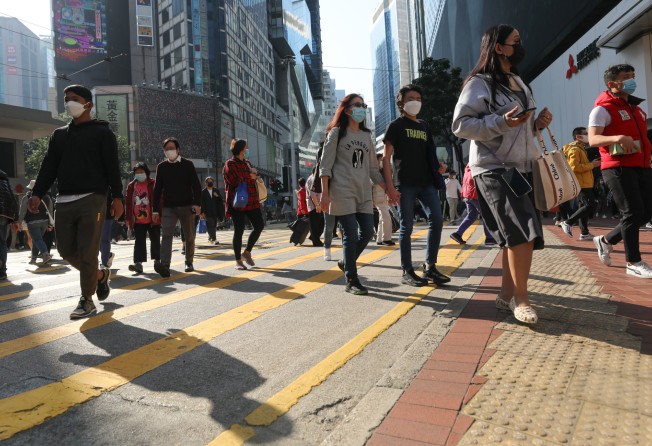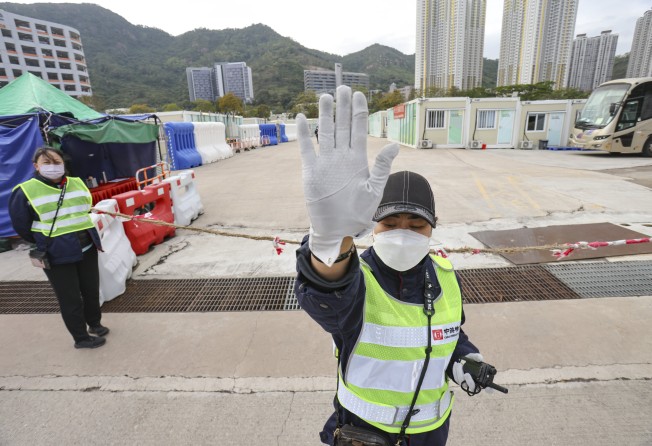
Coronavirus: Hong Kong businesses welcome move to scrap mandatory isolation for Covid patients but want more done to revive tourism
- With isolation orders axed from January 30, infected workers without symptoms will be able to return to office
- Scrapping PCR tests for cross-border travel would do more to boost lagging tourism numbers, says executive director of industry body

Hong Kong’s business community has welcomed the end of mandatory isolation for Covid-19 patients as a key step toward economic recovery, but called for urgent action to bring back mainland Chinese tourists who are a driving force for growth.
The measure, which takes effect on January 30, will allow employers to decide how to deal with employees who test positive for Covid-19, although a human resources consultant has warned of complications that may arise if workers falsely report their symptoms, putting their colleagues at risk.
Gianna Hsu Wong Mei-lun, chairwoman of the Travel Industry Council of Hong Kong, said dropping the restriction was good news for residents and visitors, but it would not be enough for many tourists to entice them to the city.
“We expect the [polymerase chain reaction] PCR test to be lifted as soon as possible,” she said on Thursday. “Hong Kong people and mainlanders find the tests difficult.”
Since quarantine-free travel was restored between Hong Kong and the mainland on January 8 for the first time in three years, the arrival of mainlanders – who accounted for most visitors to the city before the onset of the pandemic – has been limited, with the requirement of a pre-departure PCR test for cross-border travellers a key hurdle.
Fanny Yeung, the council’s executive director, said tourism would receive more of a boost by doing away with PCR tests than by simply dropping mandatory isolation for positive cases.
Under current guidelines, arrangements for handling inbound visitors who test positive are aligned with those for local residents. The latest move will thus end the requirement for travellers to declare an infection on the government’s online platform, and they will not be issued with mandatory isolation orders.

Yeung said the industry had lost 50 per cent of its manpower during the pandemic and estimated the number of tourist arrivals would not be restored to pre-Covid levels until at least the middle of 2024.
Ray Chui Man-wai, chairman of Kam Kee Holdings which operates a chain of cha chaan teng, said the PCR test and quota requirements for cross-border travel had dampened mainland visitors’ desire to return to the city, and his restaurants had seen few tourists since the reopening.
But he noted that if Hong Kong faced another major coronavirus outbreak, the flexibility in new manpower arrangements would certainly benefit the catering industry, which had been plagued by staff shortages.
Under the health authorities’ isolation orders, workers who tested positive had to isolate until their rapid antigen test turned negative two days in a row. Once the isolation requirement was scrapped, Chui said, he would be able to get his employees back to work as soon as they were well enough.
By ending the government’s isolation mandate, human resources experts said employers and their staff could finally decide – on their own terms – when and how to work once infected with Covid-19, just as they would with any other illness.
“It will become simpler and more convenient for employers because they’re returning to the old practice. For employees it’s just the same – they call in sick when they’re unwell,” said Armstrong Lee Hon-cheung, managing director of Worldwide Consulting Group.
But Alexa Chow Yee-ping, managing director of recruitment agency ACTS Consulting, said bosses might be put in an awkward position when an employee became infected but claimed to have no symptoms, as the person might fear losing income for being absent.
“One might infect other colleagues and get 10 other people sick, which is much worse,” she said, advising companies to formulate their own policies specific to their workplace, and make remote working arrangements for staff who might be infectious.
Simon Wong Kit-lung, chairman of restaurant chain LH Group, saw the end of the isolation order as another milestone towards normality that would lift consumer confidence like the scrapping of the vaccine pass scheme last month.
“I’ve been calling for a return to normality in the past six months and I think this is finally the dawn, we finally can live normal lives,” he said.
“At least now we know our business will no longer be hindered by the pandemic or the restrictions imposed on our operations.”